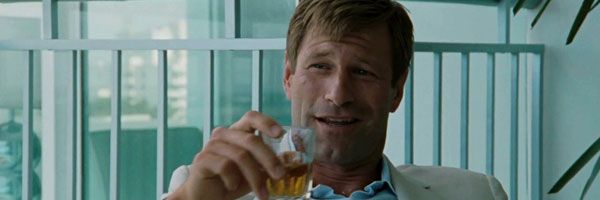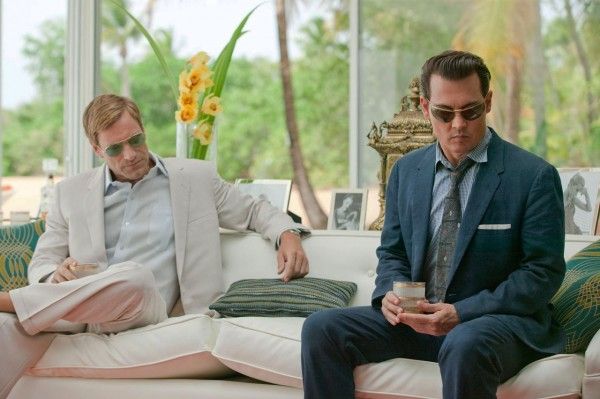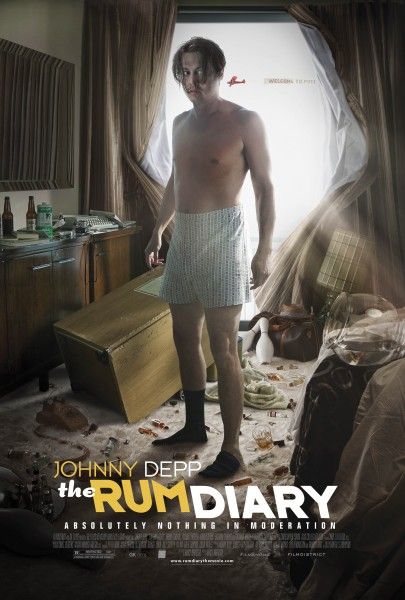In The Rum Diary, adapted from the Hunter S. Thompson novel, actor Aaron Eckhart plays Sanderson, a businessman involved in shady property development deals, determined to convert Puerto Rico into a capitalist paradise in service of wealthy Americans. When he meets journalist Paul Kemp (Johnny Depp), he recruits him to write favorably about his latest unsavory scheme, but quickly learns that Kemp is not someone easily controlled.
At the film’s press day, Aaron Eckhart spoke to Collider for this exclusive interview about what a great time he had making the film, how timeless the themes of the story are, how flattering it is to know he was the only choice for this role, and that he enjoyed watching Johnny Depp work. He also talked about his next role, playing the iconic monster in I, Frankenstein, a modern take on the classic story, and how he has no plan, when it comes to deciding which projects he’ll sign on for. Check out what he had to say after the jump:
Question: It was really nice to finally get to see this film, since we’ve talked about it a few times before.
AARON ECKHART: Yeah, I made this movie, and then Rabbit Hole, and then Battle: Los Angeles.
How did you get involved with this? Were you approached about doing the role?
ECKHART: Yes, (director) Bruce [Robinson] called up. He had needed somebody who had done that sort of character before, and he thought that I could do it, so I met him. I didn’t know Johnny [Depp] and I didn’t know anything about the story. I hadn’t read The Rum Diary, but I’ve read some of Hunter’s stuff and had heard about it. So, I came into it pretty virginess, but had a great time making it.
Did you feel really transported to that time, while shooting this?
ECKHART: Yeah, once you put on those clothes and have the cars. But, it seems like a lot of this is timeless stuff, thematically. It’s relevant today. Certainly, my character is. But, once you’re in that environment, you do lose yourself, especially in Puerto Rico ‘cause you’re either looking out to the sea or you’re looking towards the mountains. You can lose yourself in that sort of timeless place, which is good. Normally, you go to places to make a film about another place. You go to Toronto because you can’t afford New York. This movie was good because it takes place in Puerto Rico. That’s where Hunter went. So, I thought it was good for the film.
What was it like to know that you were Bruce Robinson’s first and only choice for this role?
ECKHART: Well, good, I guess. It’s a double-edged sword, in a way. This character is a detestable sort. But, on the other hand, it’s always flattering to know that people are out there thinking about you, who you don’t even know. It always surprises me. When Nicole [Kidman] said, “Oh, we wanted Aaron,” I was like, “Really?!” It’s nice because it means you work, and you’ve done something right. I guess I play a good bad businessman. He’s charming. There’s a lot to be admired, but he crosses the line.
Was it challenging to find that balance and have that charm, so that audiences aren’t completely turned off by him?
ECKHART: That’s the trick, in playing these characters. People will say, “Oh, you played the bad guy,” and I guess I have to say yes, but I never look at them as bad guys. It’s about, “How do you make him human? How do you make him likable? How do you make the audience feel conflicted?” They know how they’re supposed to feel because he’s clearly the antagonist and he’s going up against the protagonist, and in every way, they’re the opposite of each other, but you have to also create pathos and compassion for the character. It’s funny because I hadn’t even thought about this, but Paul Kemp, Johnny’s character, is put off by my unethical nature, and yet he has no problem with stealing my girl. That’s the complication about real life that’s interesting. People will take a moral stand on something, and yet, as soon as they do, they’re in the act of betrayal.
What was it like to work with Johnny Depp and collaborate on the dynamic between your characters?
ECKHART: It’s good. Obviously, he’s created some of modern cinema’s most memorable characters, from Edward Scissorhands to Pirates, and everything in between. He’s a guy that takes chances, he’s got a rich imagination, and it was a reason to do the movie. It’s always fun to watch guys like that and see how they prepare, how they come to the set, what they do while they’re on the set, and that sort of stuff. It helps inform me, as an actor, in the future. Johnny is very collaborative. We have a little bit different styles, but you’re always going after the same thing. You work together and it works. He was very gracious and very helpful, for everyone. Filmmaking is a difficult process. There are the logistics of making a film. You have to do your part, and then change the entire thing around to do someone else’s part. A lot of the magic is lost, in between that, and you have to figure out how to get it back.
Was it a collaborative process, as far as deciding the look of the character, his wardrobe and his home?
ECKHART: That’s all Bruce [Robinson]. He dresses like Sanderson, in a way. He’s very cavalier and very breezy. We just had to epitomize and characterize the island life. If you had money, the island life included linens, light colors, the wind, the sea, sandals, and that sort of stuff. Those clothes were all handmade for me, which was nice. I spent a lot of time in the water while I was there, swimming and surfing. By the time we finished this movie, I was almost a local. I spent a lot of time in the water. It was good.
What was it like to work with Amber Heard?
ECKHART: Obviously, Amber is beautiful, but she’s a good actress, she cares, she’s interested, she’s easy to work with, and she’s a lot of fun between scenes. She’s down for a good joke, and she has a good heart. It was nice to have her around because there were a lot of guys on the movie. She was up for anything, and I liked that. She smokes cigars, and I smoke cigars in the movie, so we smoked a few cigars together.
What was it like to work with Bruce Robinson, who came out of retirement to direct this film?
ECKHART: You would never have known. The guy was juiced up and ready to go, every day. He had the creative juices flowing. It’s just in his blood. Plus, he spent years adapting the book, so he was passionate about this movie and knew every nook and cranny and morsel of this film. He was totally invested in everything. When you look at a director like that, who is so passionate, I was looking at it like something between a rock star and a pirate. He had this flowing hair and these linen shirts on and he was smoking cigarillos. He was a character, himself. He and Johnny had such a good relationship. That was good to see.
Do you know which project you’re going to do next?
ECKHART: I have a movie coming out, called The Expatriate, which is a father-daughter CIA thriller. We filmed that in Europe. My character has a 15-year-old daughter, and that was fun, filming with her. And then, for the next movie I signed onto, I’m playing Frankenstein in I, Frankenstein, which is a modern take on Frankenstein.
What was the appeal of a project like that, especially since it’s so different from what you’ve done before?
ECKHART: I don’t know. There’s no rhyme nor reason. Just the fact that I just said, “I’m playing Frankenstein,” is something I never imagined. I don’t know what I’m doing. That’s my problem.
How is it different from the Frankenstein stories that people are familiar with? Is he more intelligent and evolved, as a character?
ECKHART: Frankenstein is an intelligent, evolved man, and that’s how he is portrayed in this movie, for sure. In the book, he’s very evolved. Somewhere in time, Frankenstein got dumbed down. He is a beast, but somewhere he lost his heart. I don’t know how much heart we’ll be able to get into it. It’s not a docu-drama of Frankenstein. It’s not an insightful look into his soul. It’s more of an action movie, really. But, it will be cool.
What draws you to a project? Does it start with the director, for you?
ECKHART: I have no idea. It’s different. With a movie like The Rum Diary, with Johnny [Depp], (director) Bruce [Robinson] and Hunter S. Thompson, you’ve gotta go do it. With Rabbit Hole, with Nicole Kidman, you’ve gotta go do it. Sometimes it’s about good words. Other times, I just want to go hop around and grunt and not say anything. There are those kinds of movies. Sometimes I don’t want to say another word in a movie, but I want to be very physical. And then, there’s other times where you want to go win an Academy Award. As an actor, you’re attracted to good material. You look at your character and you go, “God, I’d love to play that!” All of a sudden, an image will pop into your mind and you can feel yourself playing it. Although, it doesn’t fit into your plan and logistically you’re already busy, but you end up calling your agent and going, “Find out a way for me to do this movie.” For me, there is no plan.



